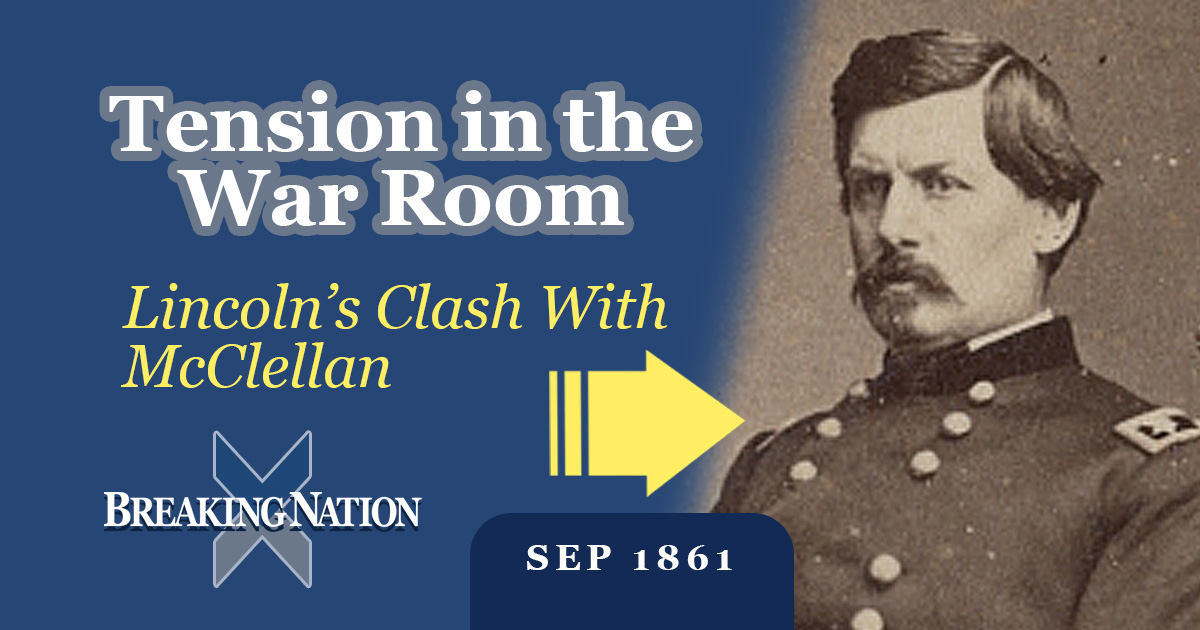Behind the Curtains of Command: Lincoln vs. McClellan

On September 27, 1861, a pivotal moment unfolded in the early days of the Civil War: Major General George B. McClellan engaged in a heated discussion with President Abraham Lincoln over the conduct of military operations. This confrontation was not merely a clash of personalities; it illuminated the profound tension between military strategy and political oversight that would characterize the Union’s war effort. McClellan, newly appointed commander of the Army of the Potomac, was celebrated for his organizational skill and his ability to inspire confidence among troops. Yet, his caution and reluctance to commit to aggressive action frequently frustrated Lincoln, who was under pressure from a war-hungry public and Congress to achieve swift victories.
The conversation on September 27 exemplifies the early struggle to reconcile Lincoln’s strategic vision with McClellan’s operational prudence. McClellan advocated for methodical preparation and expressed deep concern about the readiness of his forces, emphasizing the need for more training, fortifications, and supplies before risking a major engagement. Lincoln, meanwhile, pushed for action, aware that political and military inertia could embolden the Confederacy and weaken Northern morale. In this sense, the discussion was a microcosm of a broader tension between civilian leadership and professional military judgment—a recurring theme in American military history.
Scholarly interest in this episode often focuses on what it reveals about Lincoln’s leadership style. Unlike many contemporaries who might have deferred entirely to military experts, Lincoln actively challenged his generals, seeking to understand their reasoning while simultaneously asserting the ultimate authority of the presidency in war decisions. McClellan’s frustration with Lincoln’s insistence on pressure foreshadowed the ongoing friction that would define their relationship, ultimately contributing to McClellan’s removal in late 1862.
Beyond personal dynamics, the discussion had strategic significance. It highlighted the challenges of transforming a volunteer army into a cohesive, battle-ready force, the difficulty of aligning military plans with political imperatives, and the pressures of early wartime public opinion. While historians may debate the efficacy of McClellan’s caution, the September 27 exchange underscores a critical moment in Civil War leadership: the balancing act between careful preparation and decisive action, and the delicate interplay of personalities, politics, and strategy in shaping the course of the conflict.
This episode is thus emblematic of the Union’s broader struggle in 1861: navigating uncertainty, building military capacity, and negotiating the sometimes uneasy relationship between the commander in chief and the commander in the field. Lincoln’s insistence on pressing the war, paired with McClellan’s deliberation, set the stage for a dynamic that would influence Union strategy for the next two years.
Breaking Nation: A Civil War Podcast explores the American Civil War, its turning points, and our national memory. Discover full episodes, transcripts, and resources at www.breakingnation.com — your destination for in-depth Civil War podcast content and fresh perspectives on America’s past. Listen on Apple Podcasts, Spotify and Amazon Music.




